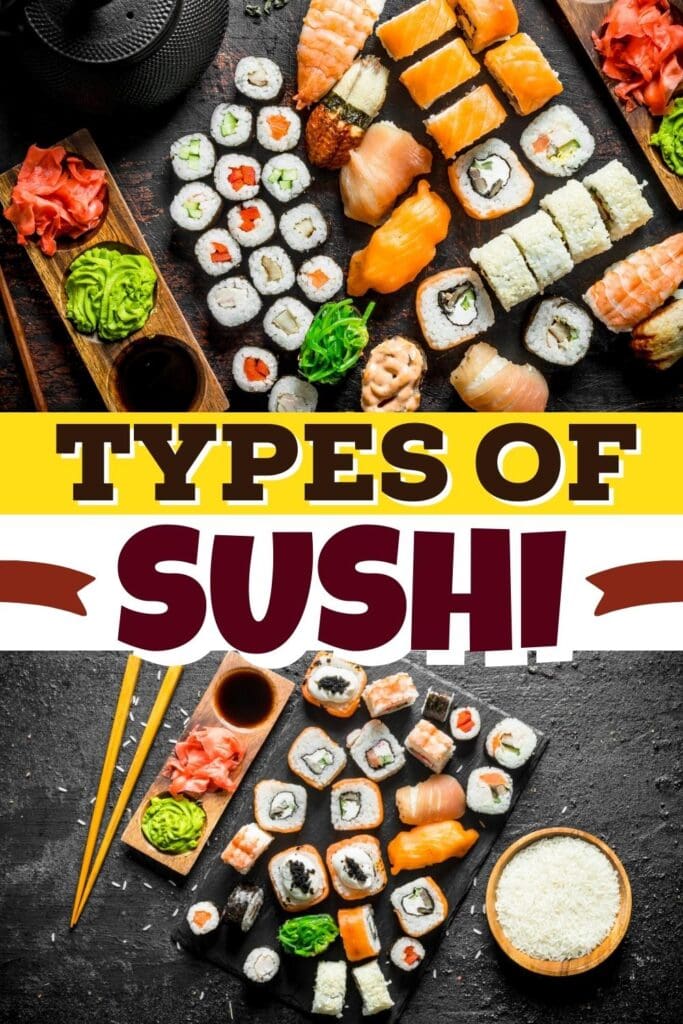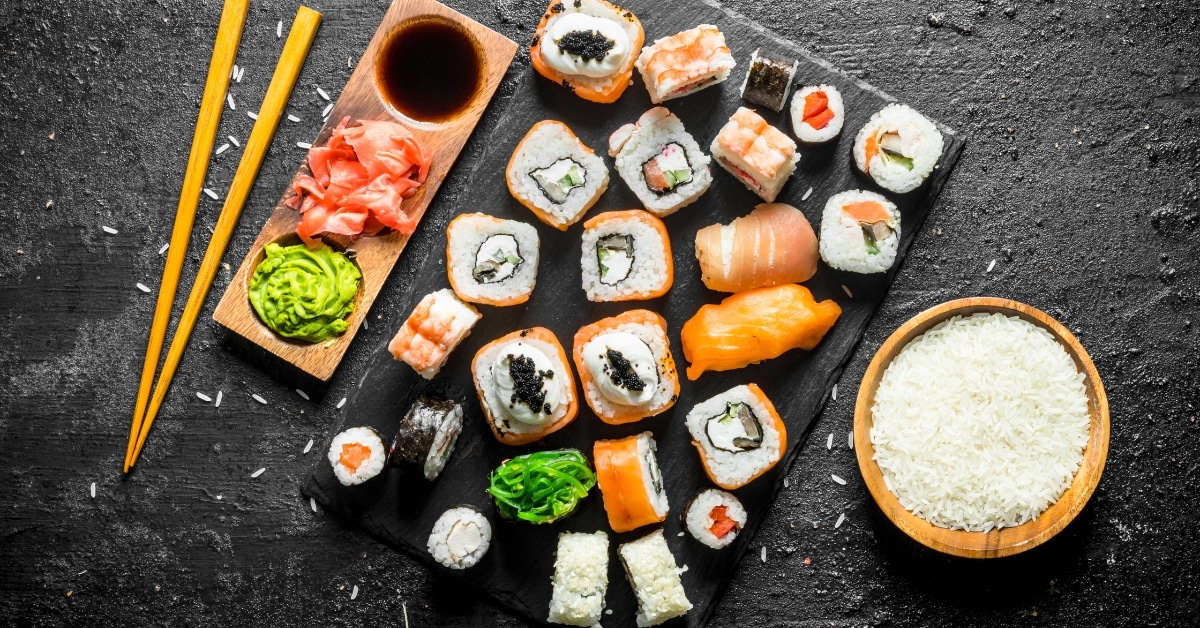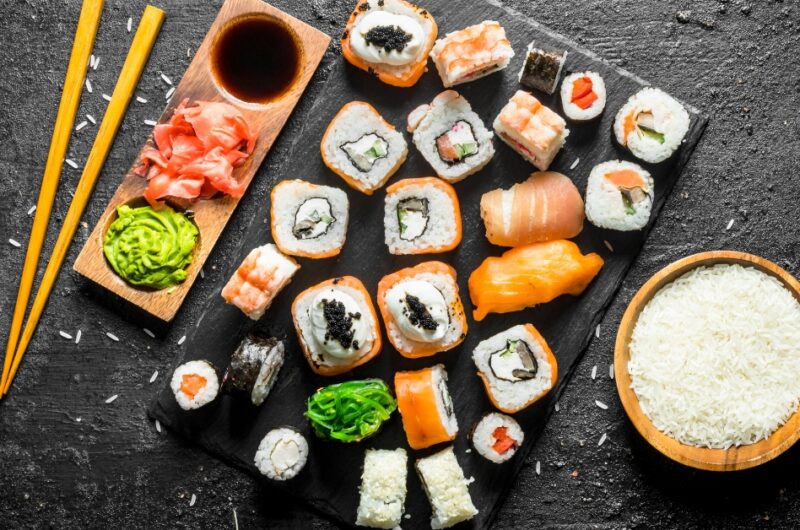If you’re an adventurous foodie, you may already be familiar with some types of sushi. But did you know that not all sushi involves seaweed?
In Japan, where sushi started, you’ll find everything from the minimalistic Nigiri to the cylindrical Maki.
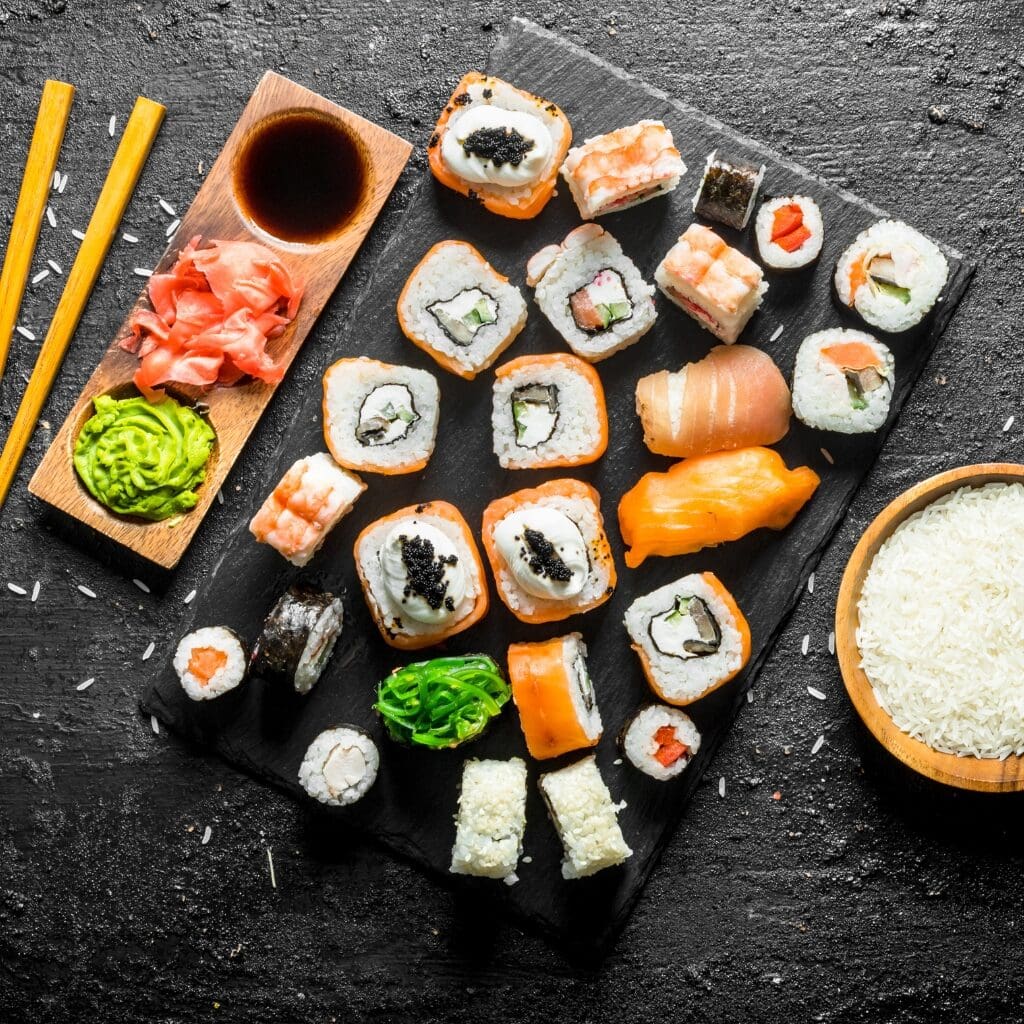
Buckle up and grab your chopsticks!
You’re about to embark on a culinary expedition. And you’ll explore the delicious, vibrant, and sometimes surprising world of sushi.
What Is Sushi?
Sushi is a popular Japanese dish typically featuring raw fish and seasoned rice. It’s not just about raw fish, as some people think.
At the heart of every piece of sushi is medium-grained and subtly seasoned rice. The rice is seasoned with a tangy mix of vinegar, sugar, and salt.
This rice (called sushi-meshi) is the unsung hero of the sushi world. It is the foundation upon which everything else rests.
When you think of sushi, you might picture beautifully arranged sushi rolls. Yet, the world of sushi extends far beyond just the rolled variety.
From hand-pressed Nigiri to bowl-style Chirashi, the forms sushi takes are incredibly diverse. And exceptionally delicious!
But what about the toppings or fillings? There’s a smorgasbord of options!
The array of ingredients can span from traditional raw seafood to cooked shrimp. Or from simple cucumber to complex combinations of flavors in specialty rolls.
You may stumble upon sushi adorned with a thinly-sliced omelet or a dollop of spicy mayo!
Sushi has found its place everywhere – from high-end restaurants to supermarket refrigerators. And from picnic baskets to lunch boxes.
Its popularity continues to soar, thanks to its harmonious blend of taste, health, and artistry.
What’s the Difference Between Sushi, Sashimi, and Nigiri?
There are some common mix-ups with sushi, Sashimi, and Nigiri. These names get thrown around a lot, but what exactly separates one from the other?
Sushi is a blanket term for dishes featuring vinegared rice. It can be paired with a range of goodies, including raw or cooked fish. Even veggies or eggs.
And remember, it’s not always rolled! So, sushi is really about that tangy rice and the variety it comes with.
Sashimi is fresh, high-quality seafood served raw. No rice in sight here! It’s often elegantly sliced and served with garnishes like daikon radish or shiso leaves.
It’s a minimalist approach that lets the quality of the fish shine through.
You can think of Nigiri as a sushi-sashimi hybrid. Nigiri is a hand-pressed mound of vinegared sushi rice topped with a seafood slice.
It can be fish, raw or cooked, or some other water-dwelling creature. Sometimes, it’s bound by a thin strip of seaweed called nori.
Types of Sushi
1. Sashimi
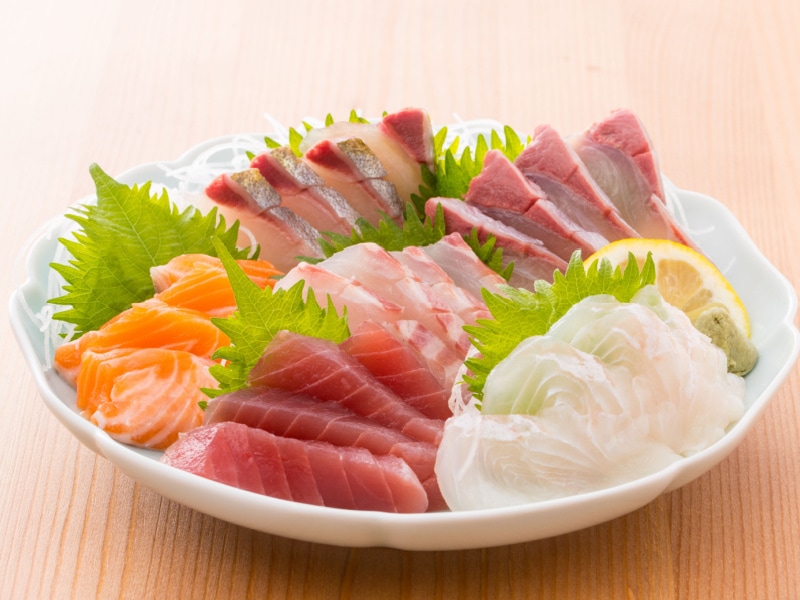
Ready for a whirlwind tour of the sashimi world? It’s a delightful exploration of flavors and textures. And each variety brings something unique to the table.
There are so many sashimi variations to love.
For example, the buttery, slightly sweet delight of Sake (salmon). Or the chewy, oceanic taste of Tako (octopus).
Sashimi presents the purest form of seafood. Each piece reflects the quality and freshness of the catch. So, grab your chopsticks and dive in!
- Sake (Salmon): Welcome to buttery bliss with a subtle sweetness. This crowd-pleaser is a sushi and sashimi superstar. No wonder it is such a favorite!
- Ebi (Shrimp): Typically cooked and loved for its subtle sweetness and firm-yet-tender bite. It’s an easy way to start your sashimi journey.
- Ahi (Tuna): Meet Ahi, Hawaiian for tuna- the robust yellowfin or bigeye varieties. Known for its bold, meaty flavor and stunning red hue. Quite a catch, huh?
- Unagi (Freshwater Eel): Unagi is a freshwater eel that’s grilled and glazed with a sweet soy-based sauce. This umami powerhouse with a tender texture takes the flavor game to a new level.
- Tako (Octopus): Embrace the diverse sashimi landscape with Tako. Its unique chewy texture and sweet, sea-like taste are a true sashimi celebration!
2. Nigiri
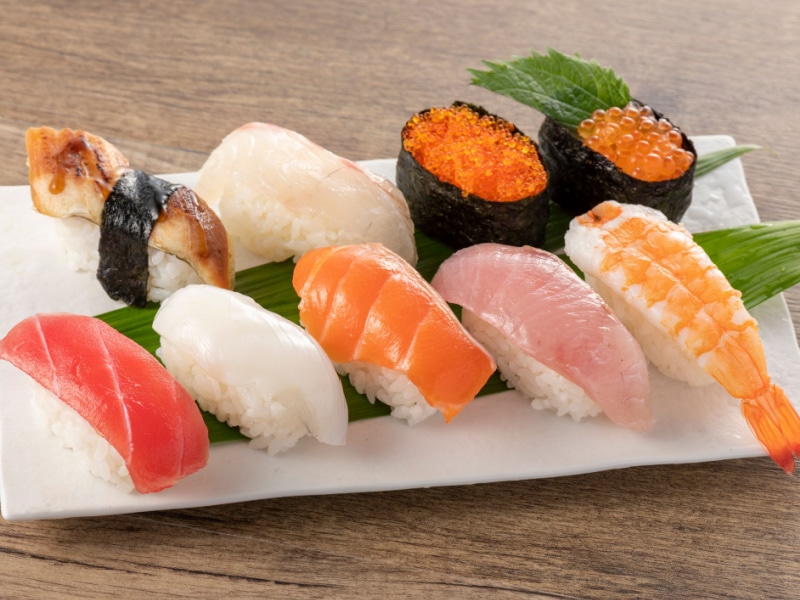
This little gem of Japanese cuisine is a perfect bite of flavor harmony. From the base of vinegared sushi rice, various toppings take center stage.
Be it the subtly sweet Ebi (shrimp) or the buttery delight of Sake (salmon). Or even the rich, hearty Maguro (tuna).
Each type of Nigiri is mouthwateringly delicious.
- Ebi Nigiri: Ebi, or shrimp, is typically cooked and laid atop a pillow of vinegared sushi rice. Its subtle sweetness and firm-yet-tender bite make it a delightful starting point for Nigiri.
- Tamago Nigiri: This one is a pleasant surprise! Tamago refers to a sweet, layered omelet served on sushi rice. It’s a delicious twist on traditional Nigiri and a must-try for egg lovers!
- Sake Nigiri: Sake, or salmon, finds a perfect home atop a mound of sushi rice. It’s buttery texture and sweet taste create a harmony of flavors you should not miss.
- Maguro Nigiri: Maguro is a general term for tuna in Japanese. Typically, it’s a slice of bluefin tuna atop sushi rice. Its hearty, meaty flavor makes it a nigiri superstar.
- Unagi Nigiri: Unagi, or freshwater eel, is glazed and grilled and finds its place on sushi rice. This creates a rich and tender nigiri variation. Its umami-packed flavor is hard to resist.
3. Maki
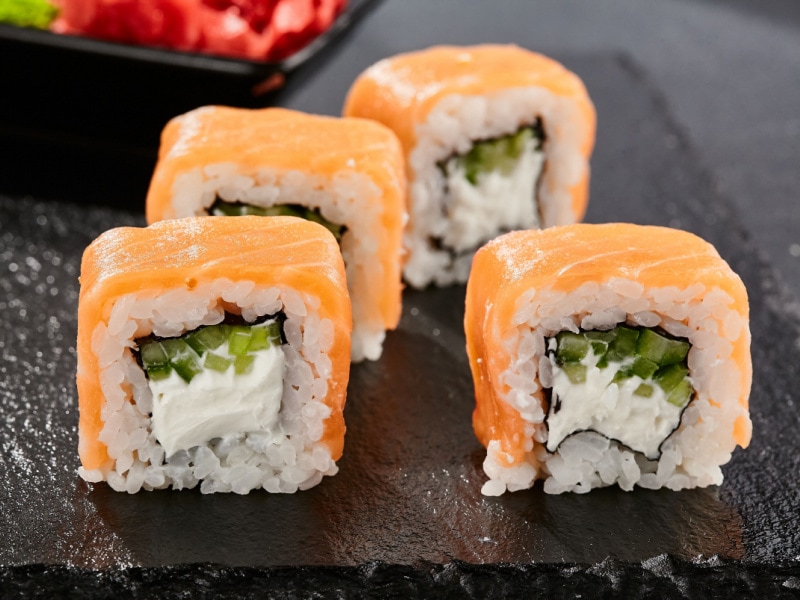
These sushi rolls come in all shapes, sizes, and fillings.
You can try the slender, single-filled delights of Hosomaki. Or, savor the tuna-packed power punch of Tekkamaki.
Maki is truly a testament to the creativity and diversity in sushi cuisine.
Each type brings a unique experience, an intricate dance of flavors and textures. And everything is wrapped up in a bite-sized package.
- Hosomaki: It is usually filled with just one ingredient, such as cucumber or tuna. Hosomaki is a minimalist delight in a bite-sized roll.
- Kappamaki: Kappamaki is a cucumber roll. It’s a refreshing ride, with crispy cucumber wrapped in sushi rice and nori. A great palate cleanser between bolder flavors!
- Tekkamaki: Here’s a classic – Tekkamaki. It’s a roll packed with fresh, high-quality tuna. It’s all about that robust, oceanic flavor.
- Futomaki: Futomaki is the showstopper with its larger size. It often contains multiple fillings, from seafood to veggies and even pickles. Each bite is a flavorful festival!
- Gunkan Maki: Last, say hello to the unique Gunkan Maki, or ‘battleship sushi’. It features a collar of nori around rice, topped with fish roe or other delicacies. It’s a small but bold flavor vessel!
4. Uramaki
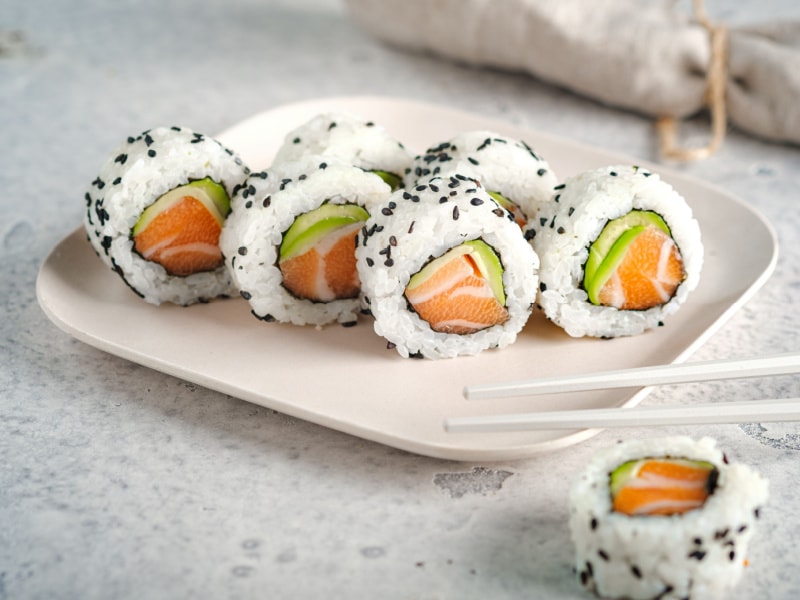
These “inside-out” rolls feature rice on the outside. And they promise a thrilling culinary journey.
There are many kinds of Uramaki to love, like the classic California Roll’s creamy delight. Or the sea-fresh charm of the Alaska Roll.
Not to mention the delightful crunch of the Spider Roll.
Each Uramaki roll bursts with flavors, expertly held together by a layer of sushi rice.
- California Roll: This famous roll stars avocado, cucumber, and crab meat. Its creamy, crisp, and subtle sweet flavors make it a sushi classic worldwide!
- Rainbow Roll: It’s a colorful feast with various types of fish and avocado adorning a California Roll. Truly, it is an aptly-named visual and culinary treat!
- Dragon Roll: This beauty has eel and cucumber inside, with thinly sliced avocado on top. It’s an enticing blend of sweet, creamy, and crisp textures!
- Spicy Tuna Roll: Featuring tuna mixed with a fiery sauce- this roll gives your tongue a delightful kick. Perfect for spice lovers!
- Philadelphia Roll: A unique fusion roll with smoked salmon, cucumber, and cream cheese. It’s a creamy, tangy delight that is hard to resist.
- Alaska Roll: Similar to a California Roll, but topped with fresh, raw salmon. A tasty nod to the seafood-rich Alaskan waters!
- Spider Roll: This one has soft-shell crab as the star, offering a fantastic crunch and sweet oceanic flavor.
5. Temaki
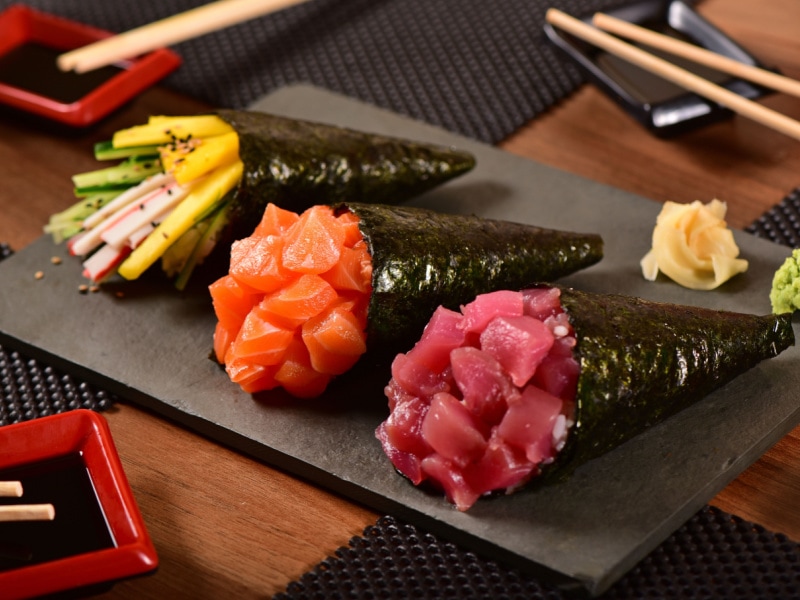
Temaki is also known as “hand rolls.” And it takes the traditional sushi components and snugly nestles them into a seaweed cone.
It’s a fun, bite-sized explosion of flavors. Temaki takes sushi to a new, exciting, and absolutely delicious dimension!
- Sushi Burrito: It’s a delightful cone of sushi happiness! Your favorite sushi ingredients, like fresh fish, veggies, or avocado, are wrapped in seaweed.
The result? A hand-rolled, party-perfect sushi cone, like a burrito!
6. Chirashi
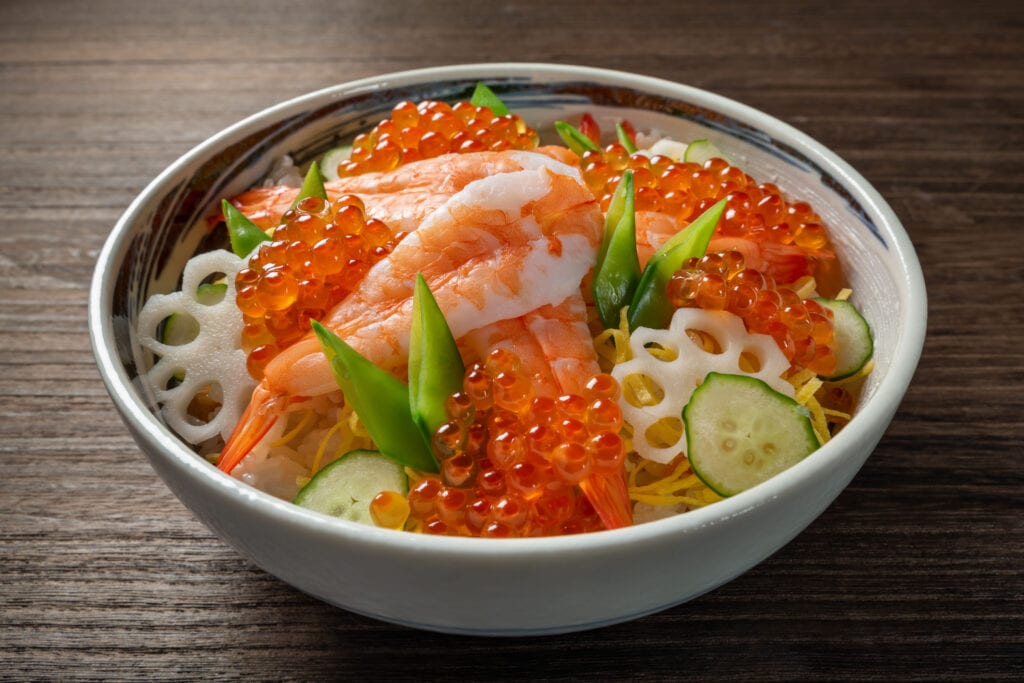
This sushi features a bed of sushi rice adorned with an array of toppings. It’s a feast for the eyes and palate.
And each style brings a new flavor narrative to your table.
Chirashi is a sushi celebration in a bowl!
- Tokyo Style (Edomae Chirashi): Edomae Chirashi is a delightful spectacle of thinly-sliced sashimi arranged over a bed of rice.
- Seafood is the star of this version. Tokyo style features treats from the sea like tuna, salmon, and shrimp.
- Each bite promises a luxurious taste of the ocean.
- Osaka Style (Gomoku Chirashi): Venture to Osaka with the Gomoku Chirashi style.
- Here, sushi rice is mixed with several ingredients such as mushrooms, bamboo shoots, and carrots. Then it is decorated with colorful toppings.
